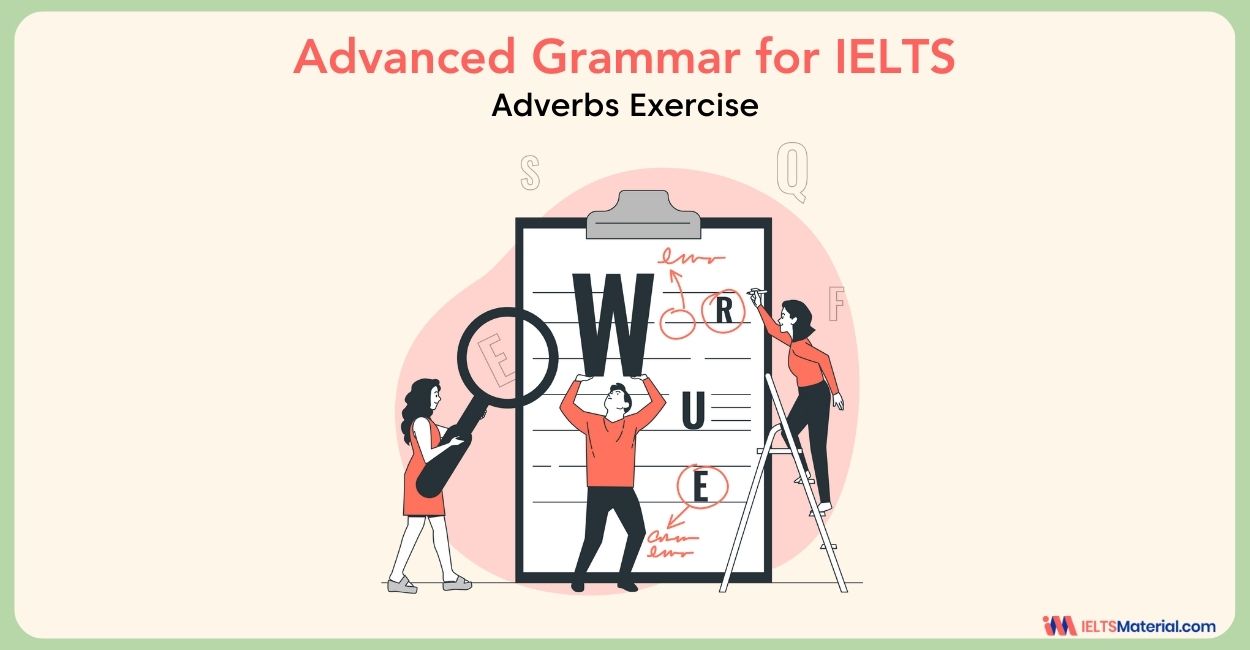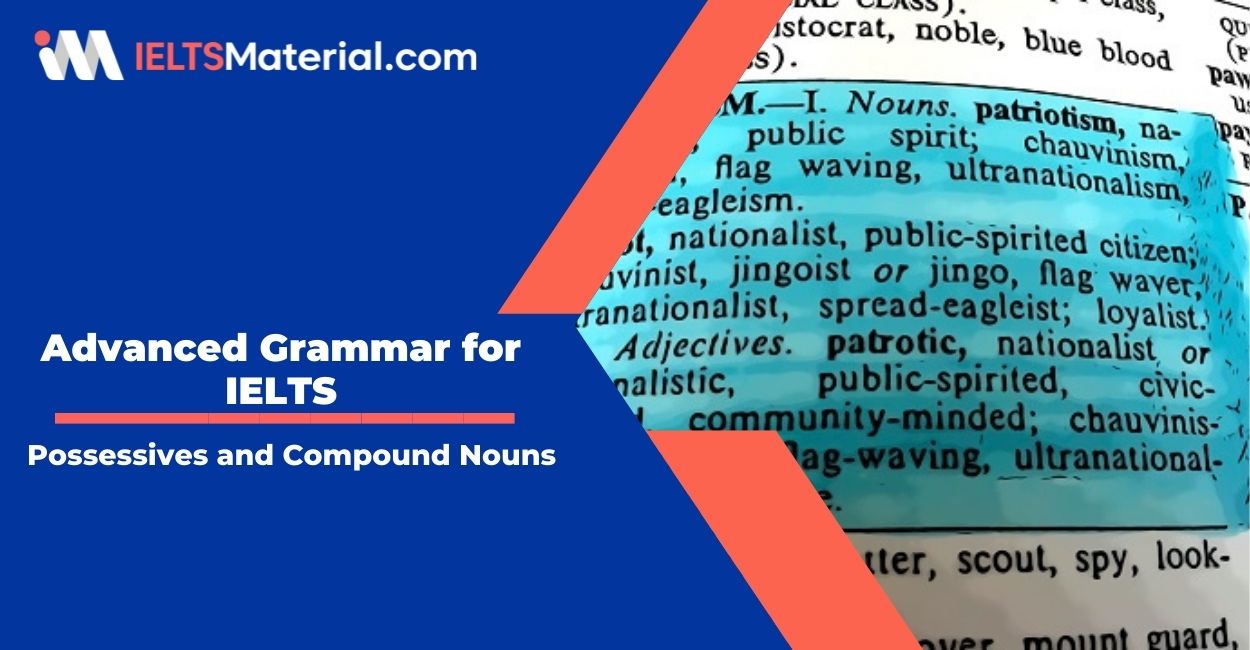Emphatic structures exercises and inversion – Advanced Grammar for IELTS
Table of Contents

Limited-Time Offer : Access a FREE 10-Day IELTS Study Plan!
Check out some important concepts from Advanced IELTS Grammar and practise the exercises given below to enhance your language skills.
Advanced Grammar for IELTS: Emphatic Structures and Inversion – Diagnose Test, Grammar Explanation & Practice Exercises
Diagnostic Test: Emphatic Structures and Inversion
Make the sentences more emphatic by rewriting them, beginning with the word(s) in brackets.
Example:
- They are doing something quite unprecedented. (What)
- => What they are doing is quite unprecedented
- The shellfish made Jasmine sick. (It was)
- Greg lost the office keys. (It)
- He’s approaching the problem from an entirely new angle. (What)
- They’ve done something unforgivable. (What)
- I came by bus because my car has broken down. (The reason)
- A second chance is the only thing I want. (All)
- The guy who told me about the new club was Zack. (Zack)
- We have to leave our bags and coats here. (This)
- They told me the same thing. (That’s)
- He’s very unlucky in love! (Lucky)
- The interactive displays were much more interesting. (Much)
- The Lord Chancellor was also at the ceremony (Also)
- The firefighters were unable to enter the building because the heat was so intense. (So)
- A parking ticket was stuck to my windscreen. (Stuck)
- Although they were defeated they managed to keep smiling. (Defeated)
- A gnarled old oak tree stands beside the river bank. (Beside)
- The midnight movie is after this. (Next)
- The government has hardly ever suffered such an overwhelming defeat. (Seldom)
- As soon as we arrived they announced that the show was cancelled. (No sooner)
- Refunds cannot be given under any circumstances. (Under)
Grammar Explanation: Emphatic Structures and Inversion
We often emphasise a particular part of a sentence, perhaps to contradict what someone else has said or for dramatic effect. While in IELTS Speaking, we can do this with stress and intonation alone, but we can also do this by changing the position of elements in a sentence in speech and writing. In this unit, we look at how we can manipulate grammar to emphasise something by splitting one sentence into two parts (cleft sentences) or bringing the element we want to emphasise to the beginning (fronting).
Cleft Sentences
Form and Use
‘Cleft’ means divided. In a cleft sentence, information which could be given in one clause is divided into two parts, each with its own verb:
- Vanessa has made the greatest impact. (normal sentence: single clause, one verb)
- It is Vanessa who has made the greatest impact. (cleft sentence: two clauses, two verbs)
This gives extra emphasis to part of the sentence. We often use this pattern to emphasise some piece of new information, to give explanations or to make a contrast with a previous statement (the emphasised information is in bold):
- All of the Redgrave family are gifted actors. But it is Vanessa who made the greatest impact in the world of feature films.
- ‘I remember your uncle taking us to the fair.’ ‘No, it was my father that took us there.’
It cleft Sentences
It cleft sentences have this structure:
it + a form of be (+ not and/or adverb) + emphasised word/phrase + that /which/ who clause
- It isn’t just his outlandish sense of humour that I’m complaining about
We can use this pattern to emphasise the subject or the object of a simple sentence, or an adverbial phrase, or a prepositional phrase:
| Sentence |
|
| Emphasising the subject |
|
| Emphasising the object |
|
| Emphasising the adverbial |
|
| Emphasising the prepositional phrase |
|
In informal English, we can use when and where clauses, but we do not use how or why:
- It was in January when I got the test results.
- It’s in Green Street market where we’ll find the best bargains.
X It was greed why he did it. ✓ It was because of greed that he did it
X It is using a calculator how he does it. ✓ It is by using a calculator that he does it
Note: We cannot use it clefts to highlight the action or a verb complement in a sentence. We use wh- clefts to do this:
X It was taking Sally to the party that Mike did. ✓ What Mike did was take Sally
X It is totally unscrupulous that they are. ✓ What they are is unscrupulous
Wh- cleft Sentences
We can use this pattern to highlight the action in a sentence. For example, if we want to highlight Mike’s action of taking Sally to the party:
wh- clause + a form of be + emphasised word or phrase
- What Mike did was take Sally to the party
In these sentences what means the thing(s) that. The wh- clause must contain a verb. To highlight the action we use a form of do in the wh- clause. The highlighted phrase usually contains a bare infinitive (example above) or to + infinitive:
- What Mike did was to take Sally to the party.
If the highlighted verb is in the continuous or perfect, the form of do matches it:
- The boys aren’t leaving Sandy at home. They are taking him to the match.
- => What the boys are doing is taking Sandy to the match
- Old members are absent but the new members have taken their seats in the assembly.
- => What the new members have done is taken their seats in the assembly
We can also use wh- clefts to highlight a verb complement. For example, if we want to highlight the complement stingy in the sentence Jean and Bob are stingy, we can say:
wh-clause + is + emphasised complement
- What Jean and Bob are is stingy!
We use this pattern most often when we want to express our opinion of something or somebody using an adjective:
- ‘Do you think Jean and Bob are a bit cautious with their money?’
- ‘Cautious? What they are is downright stingy!’
Other Types of a Cleft Sentence
We can use wh- clauses with when, where, why and who to highlight a person, a place, a time and a reason, but we usually use an introductory noun phrase (underlined below). The wh- clause acts like an ordinary relative clause:
X Who we forgot to invite was Ian. ✓ The one (who) we forgot to invite was Ian
| Person |
|
| Place |
|
| Time |
|
| Reason |
|
We can emphasise an item (described by a noun phrase or a verb phrase) with the (only/ last) thing or all:
- The thing I most disliked about the movie was the scene in the graveyard
- The only thing we want is a chance to air our grievances.
- The last thing we did was pack the kettle.
- All we’re asking for is to be given a chance
We can also use the (only) thing with a negative verb:
- The thing we won’t do is repair goods bought in other shops.
- The only thing we didn’t find was the key to the cellar.
Reversed Cleft Sentences
We can reverse the order of the parts in wh- cleft sentences and put the emphasised part at the beginning:
- Taking Sandy to the match is what the boys are doing.
- Zack was the guy who told me about the new club.
There is a form in spoken English similar to a reversed cleft using this and that:
- We have to get off here => This is where we have to get off.
- They told me the same thing => That’s what they told me.
Note: We only use reversed it clefts in a formal literary style. We put the emphasised part before it:
- And thus Cezanne it was that took the first steps on the road to Impressionism.
Fronting
Fronting Objects and Complements
In spoken English, we sometimes want to make a strong contrast with something in a previous statement. We can do this with objects and complements by ‘fronting’ them (moving them to the front of the clause), which makes them more emphatic:
- ‘She’s such a lovely person; so friendly and reliable.’
- ‘She may be friendly but she isn’t reliable.’ => Friendly she may be, but reliable she isn’t!’
We can also front demonstrative pronouns for emphasis:
- I disagree with that. => That I disagree with.
We can use fronting to help the flow of spoken or written information by putting the known information at the beginning of the sentence:
- The house was large and sprawling, with two wings and a dark attic. Hilary spent most of her time in the drawing-room or the garden. The attic she rarely visited.
Fronting Adjective Phrases; also and such
When we want to start a sentence with known information or we want to make an emphatic comparison with the information in a previous sentence, we can use a comparative or superlative phrase at the beginning. We use a form of the verb “be” followed by the subject :
- The first band was dire. Much more exciting was Red Heat, the second group to play.
- Many of the monuments are truly awesome. Best of all is the Colosseum.
- The actors were a mixed bunch. Least inspiring of the lot was Pacino.
We can use a similar pattern with also and such:
- Members of the royal family attended the funeral. Also at the service were several ambassadors.
- They led a life of abject poverty. Such is the fate of most illegitimate children in this province.
We can emphasise an adjective by using so + adjective + a form of be + subject + a that clause:
- So intense was the heat (that) the firefighters were unable to enter the building for two hours.
Fronting Adverbials and Infinitives; as and though
We can put known information at the beginning of a sentence by putting adverbial phrases describing position or place (e.g. At the back of the house), verbs of position and movement (e.g. stand, attach, lie) and to + infinitive forms in the front position, with inversion of the subject and the verb be:
- At the back of the house was an untidy garden, much of which was taken up by a large and unkempt lawn. Standing in the corner of the garden was a massively overgrown silver birch tree which towered over the roof of the garage. Attached to the roof was an unsightly FM aerial.
- For years I have been writing to the President in the White House. To meet him is my most fervent wish.
We can also front an infinitive form when it ‘echoes’ an earlier verb:
- He said he would arrive on time.
- And he did (arrive on time).
- => And arrive on time he did.
We can front verbs and adjectives using as and though:
- Battered though he was, he never lost his will to succeed.
- Try as she might, she simply couldn’t open the jam jar.
Inversion
Subject-verb Inversion
We sometimes put a verb or verb phrase in front of the subject after adverbs of place (e.g., on, in, here, there, outside, opposite) and adverbs of time (e.g., next, then, first, now, finally). We can use a form of be or verbs of place and movement (e.g., stand, sit, lie, come, go, climb, run. sail, fly) before the subject. We often use this pattern to form a link with the information in the previous sentence, and it is common in formal English:
| Place adverbs + be or verbs of place/movement
|
|
| Time adverbs + be or verbs of place/movement
|
|
Note: We don’t use inversion if the subject of the clause is a pronoun:
- Here comes the bus.
- X Here comes it ✓ Here it comes.
We can also use inversion in “as” and “than” clauses in formal English:
- Mr Slater is expecting a pay rise, as are several other salesmen in the team.
- I’m afraid her proposals are no more feasible than are those James presented.
We also use inversion in certain fixed expressions, often with subjunctives :
- So be it.
- Long live the king!
Subject-auxiliary Inversion
We sometimes put an auxiliary (do. have, should, can, etc.) before the subject in statements; the rest of the verb phrase follows the subject. We use this pattern of inversion for emphasis in the following cases:
| after adverbs with ‘restrictive’/
negative meaning (e.g. hardly, scarcely, rarely, little, never) |
|
| only + time expression or
prepositional phrase |
|
| (in) no way, at no time,
under no circumstances, on no account |
|
| not + only/ time expression/ person or thing |
|
| no sooner … than |
|
| clauses beginning with
neither or nor |
|
| clauses beginning with may
which describe a strong wish |
|
| after fronted comparisons
also, such and so |
|
Note: Expressions with no, not, etc. not listed above (e.g. no doubt) cannot be inverted:
X No doubt will he give us a key. ✓ No doubt he will give us a key.
Note: We do not invert the subject and auxiliary after only if there is no time expression or prepositional phrase immediately after it:
X Only can members park there.
✓ Only members can park there.
✓ Only on Sundays can members park there.
Practice Exercise
Practice the exercise given below to revise how to use them and achieve a high IELTS band score.
Q 1.
Read the information in the box then complete the replies. Each reply must contain a cleft sentence. The exercise begins with an example (0).
| Nick turned up late for work on Monday because he got stuck in a traffic jam on the ring road. Luckily Nick has a mobile phone so he was able to phone his boss and warn her that he would be late. She was furious but managed to reschedule an important meeting for the afternoon. |
- (0) ‘Didn’t the boss turn up late on Monday?’
- ‘No, it…was Nick who turned up……late on Monday.’
- ‘Nick was late because he overslept, wasn’t he?’
1. ‘No, it____that he was late.’
- ‘How on earth did Nick let the boss know he’d be late?’
2. ‘Well, what ____call her from his mobile phone.’
- ‘Wasn’t Nick late on Wednesday?’
3. ‘No, ____that he was late.’
- ‘Nick’s boss had to start the meeting without him. didn’t she?’
4. ‘No, what she ____the afternoon.’
- ‘Didn’t Nick get stuck in a traffic jam in the town centre?’
5. ‘No, not the town centre; it ____ got stuck.’
- ‘Didn’t the boss have to reschedule that meeting because the client didn’t turn up?’
6. ‘No, it _____ had to reschedule the meeting.’
- ‘Nick rang the boss to give her the sales figures, didn’t he?’
7. ‘No, it _____that he rang her.’
- I heard the boss was a little annoyed with Nick for being late.
9. ‘No, she wasn’t “a little annoyed”. What ____!’
Q 2.
For each of the sentences below, write a new sentence as similar as possible in meaning to original sentence, but using the words given in bold.
- (0) Sebastian left the job because of the long working hours.
- why–The reason why Sebastian left the job was the long working hours.
- We have to wait here.
1. this
- We just need five minutes to fix it.
2. all
- Jennifer started the strike.
3. person
- I’m not questioning his dedication.
4. isn’t .
- These men are totally ruthless.
5. what
- I used to live around the corner.
6. the place
- It was your next-door neighbour who complained.
7. the one
- We inherited everything except the house.
8. only thing
- You know the sales assistant told me exactly the same thing.
9. that’s
- I want you to copy this down in your notebooks.
10. to do
- First of all, we checked the insurance details.
11. first thing
- The climbers reached the peak at six o’clock.
12. was
- We’re taking the au-pair with us.
13. doing
- Before leaving we switched off the power supply.
14. last thing
- They moved to Andalucía because of the climate.
15. reason .
- The company has imposed a ban on private e-mails.
16. has done
- The only thing we want is our money back.
17. all
- Our boss told us the news.
18. it
- I want you to appreciate that it’s not my fault.
19. what
- The introduction of stamp duties led to the loss of the American colonies,
20. that
Q 3.
Make these sentences more emphatic by ‘fronting’ part of them. Do not use any additional words.
- (0) I can’t stand hypocrisy. => Hypocrisy I can’t stand!
- Though he was exhausted, he managed to reach the finishing line.
- My life’s ambition is to make the pilgrimage to Mecca.
- The ninth symphony is his most sublime work.
- I really can’t accept that proposal.
- An enormous gold Buddha was placed on the altar.
- The Cresta Run is much more challenging for the dedicated skier.
- Several sharp criticisms of ministerial conduct were also included in the report.
- An old man was lying in the shop doorway.
- It proved impossible to get to the bottom of the mystery.
- The pilot couldn’t regain control because the damage was so severe.
Q 4.
In twelve of the following sentences, there are mistakes with word order and missing auxiliaries. Tick (✓) the correct sentences and then find the mistakes and correct them.
- They’re going to complain about this and so are we.
- Little we knew the full extent of his involvement in the fraud.
- The sales director is resigning and so most of the marketing team are.
- I tried to get there by nine, only was there a traffic jam on the motorway.
- Over there stood the three-metre tall statue of Lenin.
- The embassy refuses to intervene. Well, so it be.
- Tomorrow the first day is of the rest of your life.
- Long live the glorious republic!
- No way is the boss treating me like that and getting away with it!
- Under no circumstances, latecomers will be admitted to the auditorium.
- Armando and Josepha are quite destitute and such the condition is of many of the refugees.
- Now the time is for wise investors to think seriously about buying Treasury Bonds.
- Rarely had we encountered such friendly and positive attitudes.
- Oh look – here comes the procession at last.
- Not since Kubrick’s 2001 a director has made such an intellectually challenging sci-fi movie.
- The government’s proposals are unrealistic, as those are of the opposition.
- Opposite this house ran the old city walls.
- Only with the greatest of luck, he managed to escape from the rising floodwaters.
- May John and Carol have a long and happy life together.
- No doubt didn’t he realise the consequences of his actions.
Q 5.
Rewrite the replies in these mini-dialogues to make them more emphatic by using suitable structures (cleft sentences, fronting or inversion) to emphasise the underlined items. The exercise begins with two examples (0) and (00).
- (0) ‘That dress looks expensive.’
- ‘No, the shoes were expensive, not the dress.’ => ‘No, it’s the shoes that were expensive, not the dress’.
- (00) ’Did Darren help you with the decorating?’
- ‘No, he did the wallpapering, nothing else.’ => ‘No, the only thing he did was the wallpapering’
- ‘Jerry says Liz is going to quit her job at the bank.’
‘1. I find that really hard to believe.’
- ‘You look as though you’re destroying that rose bush.’
2. ‘No, I’m just cutting off the dead flower heads.’
- ‘Are you sure you brought everything with you?’
3. We left the personal stereo behind, that’s all.’
- ‘Didn’t you own a Volkswagen Golf once?’
4. ‘No, my brother owned one.’
- ‘He said the speech would shake them up a bit.’
5. ‘And it certainly did shake them up.’
- ‘I thought the car chase and the scene in the airport were brilliant.’
6. ‘But the explosion on the jumbo jet was best of all.’
- ‘I think we should try to give them first aid.’
7. ‘No, we should wait for the ambulance to arrive.’
- ‘So what was so awful about the view from your hotel room?’
8. ‘Well, a huge electricity pylon was standing right outside the bedroom window.’
- ‘You’ve always wanted to buy a cottage in the country, haven’t you?’
9. ‘Yes, my greatest ambition has always been to own a cottage.’
- ‘You’re all leaving on Saturday, aren’t you?’
10. ‘No, we’re going on Friday.’
Q 6.
In the following magazine article ten emphatic sentences have been changed and underlined. Rewrite the sentences in their original emphatic form using the clues in brackets. The first one has been done as an example (0).
RAP JUMPING?
NO WAY, JOSÉ!
I’m quite sporty and I love a new challenge, especially if it’s a little bit risky. I often try out new things with my friends Tony and Bruce. (0) In fact, Bruce told me about his new hobby – rap jumping. (1) I’ve done bungee jumping before – that’s the sport where you jump off a crane or bridge with your feet attached to a long length of elastic – so I had some idea what he was talking about. Bruce promised me that (2) rap jumping was more exciting and a lot more dangerous than bungee jumping, and (31 he didn’t tell me too much about it to keep me in suspense. So, of course, I was dying it give it a go.
(4) But Tony actually took me for mv first rap jump. (5) He’s the real daredevil. We went to the top of this tall building which had a sort of gantry overhanging the edge. (6) I could see a rope and a harness hanging from the gantry.
‘Oh, I understand,’ I said to Tony, ‘I get into the harness and then lean back over the edge and lower myself down – it’s like abseiling.’
‘No, no,’ said Tony, ‘(7) You lean forward and walk down.’
I began to feel a little sick. I don’t normally suffer from a fear of heights because I avoid it by looking up or sideways. (8) I can’t cope with seeing the ground. The idea of going over the edge facing downwards was just too much for me. ‘(9) I’m not doing that.‘ I announced.
Well, would you have done it?
(0) (it) => In fact, it was Bruce who told me about his new hobby.
1. (fronting)
2. (not only)
3. (fronting)
4. (it)
5. (the one)
6. (all)
7. (What)
8. (It’s)
9. (No way)
Answer Key for Diagnostic Test
- It was the shellfish that made Jasmine sick.
- It was the office keys (that) Greg lost./ It was Greg that lost the office keys.
- What he’s doing is approaching the problem from an entirely new angle.
- What they’ve done is unforgivable!
- The reason (why) I came by bus is (that) my car has broken down.
- All I want is a second chance.
- Zack was the guy who told me about the new club.
- This is where we have to leave our bags and coats.
- That’s what they told me.
- Lucky in love he isn’t!
- Much more interesting were the interactive displays.
- Also at the ceremony was the Lord Chancellor.
- So intense was the heat (that) the firefighters were unable to enter the building.
- Stuck to my windscreen was a parking ticket.
- Defeated though they were, they managed to keep smiling.
- Beside the river bank stands a gnarled old oak tree.
- Next is/ it’s the midnight movie.
- Seldom has the government suffered such an overwhelming defeat.
- No sooner had we arrived than they announced that the show was cancelled.
- Under no circumstances can refunds be given.
Answer Key for Practice Exercise
Q 1.
- No, it was because of the traffic jam that he was late.
- Well, what he did was (to) call her from his mobile phone.
- No, it was on Monday that he was late.
- No, what she did was (to) reschedule the meeting for the afternoon.
- No, not the town centre; it was on the ring road that Nick got stuck.
- No. it was because Nick was late that she had to reschedule the meeting.
- No, it was to warn her that he would be late that he rang her.
- What she was was furious!
Q 2.
- This is where we have to wait.
- All we need is five minutes (to fix it).
- The person who started the strike was Jennifer./ Jennifer was the person who started the strike.
- It isn’t his dedication (that) I’m questioning.
- What these men are is totally ruthless.
- The place where I used to live is around the corner.
- The one who complained was your next-door neighbour./ Your next-door neighbour was the one who complained.
- The only thing we didn’t inherit was the house./ The house was the only thing we didn’t inherit.
- That’s exactly what the sales assistant told me.
- What I want you to do is (to) copy this down in your notebooks.
- The first thing we did was (to) check the insurance details.
- It was at six o’clock (that) the climbers reached the peak./ It was six o’clock when …
- What we’re doing is taking the au-pair with us.
- The last thing we did (before leaving) was (to) switch off the power supply.
- The reason (why) they moved to Andalucía was the climate./The climate was the reason (why) they moved to Andalucía.
- What the company has done is imposed a ban on private e-mails.
- All we want is our money back.
- It was our boss who told us the news.
- What I want you to appreciate is that it’s not my fault.
- It was the introduction of stamp duties that led to the loss of the American colonies.
Q 3.
- Exhausted though he was, he managed to reach the finishing line.
- To make the pilgrimage to Mecca is my life’s ambition.
- His most sublime work is the ninth symphony.
- That proposal I really can’t accept.
- Placed on the altar was an enormous gold Buddha.
- Much more challenging for the dedicated skier is the Cresta Run.
- Also included in the report were several sharp criticisms of ministerial conduct.
- Lying in the shop doorway was an old man.
- To get to the bottom of the mystery proved impossible.
- So severe was the damage that the pilot couldn’t regain control.
Q 4.
1 ✓
2 we knew => did we know
3 and so most of the marketing team-are => so are most of the marketing team
4 was there => there was
5 ✓
6 so it be => so be it
7 Tomorrow the first day is => Tomorrow is the first day
8 ✓
9 ✓
10 latecomers will => will latecomers
11 such the condition is => such is the condition
12 the time is => is the time
13 ✓
14 ✓
15 a director has made => has a director made
16 as those are => as are those
17 ✓
18 he managed to escape => did he manage to escape
19 ✓
20 didn’t he => he didn’t
Q 5.
1 That I find really hard to believe.
2 No, what I’m doing is cutting off the dead flower heads.
3 All we left behind was the personal stereo./The only thing …
4 No, it was my brother (who owned one).
5 And shake them up it certainly did.
6 (But) best of all was the explosion on the jumbo jet.
7 No, what we should do is wait for the ambulance to arrive.
8 Well, (standing) right outside the bedroom window was a huge electricity pylon.
9 Yes, to own a cottage has always been my greatest ambition.
10 No, it’s (on) Friday that we’re going.
Q 6.
- Bungee jumping I’ve done before.
- Not only was rap jumping more exciting than bungee jumping, but it was also a lot more dangerous./ rap jumping was not only more exciting but also a lot more dangerous than bungee jumping.
- To keep me in suspense he didn’t tell me too much about it
- But it was Tony who actually took me for my first rap jump.
- He’s the one who’s the real daredevil.
- All I could see was a rope and a harness hanging from the gantry.
- What you do is lean forward and walk down.
- It’s seeing the ground that I can’t cope with.
- No way am I doing that!

Start Preparing for IELTS: Get Your 10-Day Study Plan Today!
Develop your Grammar from our Grammar Topics

Janice Thompson

Zuhana

Courtney Miller
Recent Articles

Courtney Miller

Zuhana

Janice Thompson






Post your Comments